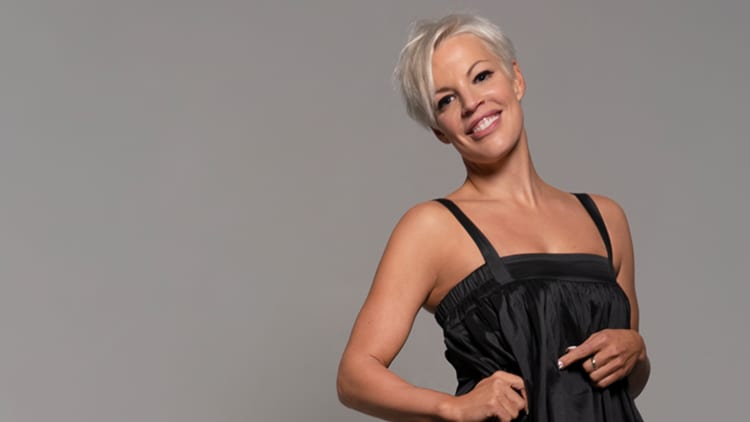
Almost every parent yells at their child eventually, no matter how hard they try to stay calm.
“The best, most well-intentioned parents will lose it from time to time,” Jazmine McCoy, a clinical psychologist based in the Atlanta suburbs, tells CNBC Make It.
When those moments are uncommon, they probably won’t leave lasting damage to your relationship with your child, especially if you apologize for overreacting, says McCoy, a mother of three who is known as “The Mom Psychologist” to her social media followers.
But “if it’s constant and chronic, it can interfere with a child’s connection [to their parent],” she says.
McCoy tackles this subject often, hosting a free, 45-minute virtual workshop on her website about how to discipline your children without resorting to yelling. Keeping a calm head in overwhelming situations can help you develop your kids’ emotional intelligence and confidence, she says — which go a long way toward making them happier and more successful throughout their lives.
Here’s why yelling can be so damaging, how to identify your own triggers and what you should do the next time you catch yourself losing your cool, says McCoy.
The lasting negative effects of yelling
Children who are constantly yelled at by their parents are more likely to develop behavioral problems, low self-esteem and depression, according to a 2013 study published in The Journal of Child Development.
“If this is your ultimate dynamic with your child, and there’s not a lot of other positive interactions, [that] is going to interfere with the connection, which then interferes with their behaviors,” McCoy says. “Because kids who … feel more connected with us and feel more supported by us, well, they’re going to do better. They’re going to be more successful, happier, etc.”
Yelling isn’t even particularly effective at correcting your kids’ negative or disruptive behavior, McCoy says. Instead, she notes, it triggers a stress response in their brain that leads to heightened anxiety — which can stand in the way of their ability to learn and develop, studies show.
“We just need to remember that when we yell, our children are actually not learning. Because they’re stressed, and we don’t learn when we’re stressed,” she says. “So it kind of goes against what our ultimate goal is.”
Why parents yell and how to spot your own triggers
Every parent is set off by different behaviors and scenarios, McCoy says: “I could be triggered by [a mess], and somebody else would be like … ‘That mess is fine.'”
You’re more likely to resort to yelling when you’re already dealing with feelings of “helplessness, overwhelm, anxiety” and when the stress of balancing work and family responsibilities leads you to feel like you’re in a “time pressure cooker,” she says.
Whether you’re generally stressed or frustrated by one specific behavior from your child, McCoy suggests engaging in some deep self-reflection to better understand and get to the root of your emotions.
Journaling can help, she says, because it’s an organized and objective way to ask and answer questions like:
- What are the situations where I feel the most frustrated?
- Why does this specific behavior frustrate me?
- What is it about the behavior that is frustrating?
Understanding your triggers, and why they set you off, can help you catch yourself before losing your cool in front of your kid, says McCoy. You might remind yourself that tantrums are normal for young children, as is the need to repeat certain instructions over and over again.
And when parents feel the urge to yell, “[we should] try our best to pause and think of a more positive helpful statement,” McCoy says. “Like, ‘This is not an emergency. I can take a break. I can pause. I can handle anything that comes my way.'”
Don’t forget to apologize
Especially in the social media age, you might feel held to an unrealistic standard of perfection — but parenting is hard, and it’s normal to feel overwhelmed to the point of screaming at your kids, McCoy says.
If you can’t stop yourself before losing your temper, what happens next becomes incredibly important for maintaining a strong, trusting connection with your child. Apologizing “is incredibly healing and therapeutic” for both of you, McCoy says.
“I think one of the best things a child can hear from their parent is: ‘I’m sorry … I’m working on this and I’m not perfect,'” she adds.
Be clear about what you’re apologizing for, she advises. Let your child know that it’s your responsibility to calm yourself down, not theirs. Ask them how your yelling made them feel: Were they scared or hurt?
By doing that, you’re modeling good behavior for your child — showing them an appropriate way to behave after an outburst. You’re also inviting them to name and share their own emotions, which can help them develop their emotional intelligence.
“You open it up for them to share their emotions,” says McCoy. “And you’re welcoming them into the relationship to share their honesty, which again, goes to raising emotionally intelligent, successful kids.”
DON’T MISS: Want to be smarter and more successful with your money, work & life? Sign up for our new newsletter!
Get CNBC’s free Warren Buffett Guide to Investing, which distills the billionaire’s No. 1 best piece of advice for regular investors, do’s and don’ts, and three key investing principles into a clear and simple guidebook.

